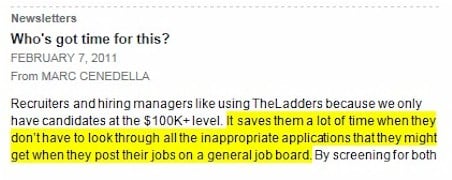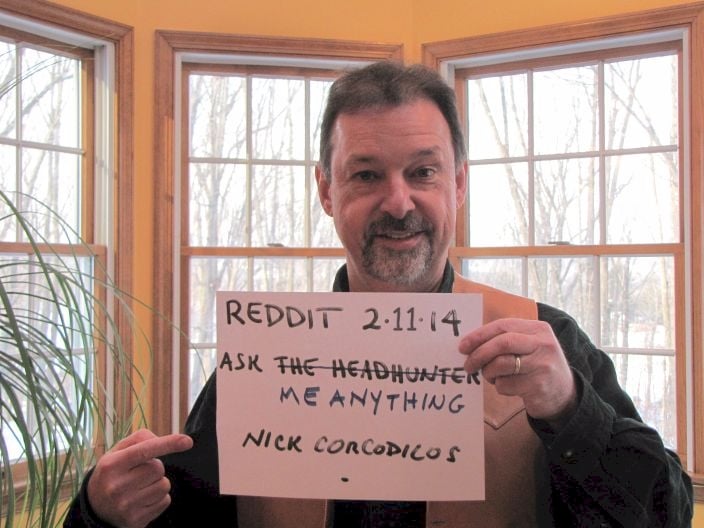 During the many years this blog has reported the questionable practices of TheLadders, angry Ladders customers who felt scammed often commented that someone should file a class action against the company. Their wishes have come true.
During the many years this blog has reported the questionable practices of TheLadders, angry Ladders customers who felt scammed often commented that someone should file a class action against the company. Their wishes have come true.
The United States District Court, Southern District of New York, has ruled that a consumer action lawsuit may proceed against TheLadders, a job board that long claimed to be “exclusive” for “only $100k+” job seekers and “only $100k+ jobs.”
The case was filed March 2013 by Bursor & Fisher, New York City consumer class action attorneys. A month after the filing, TheLadders CEO Alex Douzet appeared on WNYC radio and said, “This case has no merit, and we hope that it will be thrown out of the court quickly.”
In an order issued March 12, 2014, the federal Court denied TheLadders’ motion to dismiss the suit brought by its customers for “breach of contract” and “deceptive acts or practices.”
Plaintiffs in the case allege they paid for job postings and resume services that TheLadders failed to deliver, and that TheLadders used deceptive advertising that often appeared on the company’s website:
“TheLadders reviews each job listing found online or submitted by recruiters and employers before it’s posted to ensure it meets the criteria of a $100K+ position.”
The Court noted that TheLadders advertised itself as:
“a premium job site for only $100K+ jobs” where “[e]xperts pre-screen all jobs so they’re always 100K+” and members would “find hand-selected and pre-screened jobs that are $100K+.”
 Plaintiffs say that job positions either did not exist or had salaries less than TheLadders promised. But in its motion to dismiss the case, TheLadders asserts that its customers should know better than to confuse ads on the company’s website with promises the company makes in its contract. The Court noted in its order that:
Plaintiffs say that job positions either did not exist or had salaries less than TheLadders promised. But in its motion to dismiss the case, TheLadders asserts that its customers should know better than to confuse ads on the company’s website with promises the company makes in its contract. The Court noted in its order that:
“The defendant [TheLadders] argues that these representations were mere advertisements and were not terms of any contract.”
Some of the plaintiffs also allege that TheLadders “scammed” them and was “knowingly deceptive” when it offered an “expert resume critique” that was actually just a sales pitch copied from a “crib sheet.” One of the plaintiffs says a resume “expert” at TheLadders produced a scathing critique of his resume — which he had previously paid TheLadders to write for him.
TheLadders told the Court that its Terms of Use “disclosed that the website would not guarantee the quality of the job listings or the services.”
“…the resume plaintiffs’ allegation that misrepresenting a sales pitch as ‘expert resume critique’ is also sufficient to support an inference that the defendant’s behavior was ‘knowingly deceptive,’ especially in light of the alleged instructions to the sales personnel on how to represent themselves as ‘writer[s] and analyst[s]’ in order to convince the client about their qualifications.”
The Court granted TheLadders’ motion to dismiss claims of plaintiffs who were outside the statute of limitations, but the Court denied TheLadders motion to dismiss all the plaintiffs.
According to the complaint,
“From its inception until September, 2011, TheLadders scammed its customers into paying for its job board service by misrepresenting itself to be ‘a premium job site for only $100k+ jobs, and only $100k+ talent.’ In fact, TheLadders sold access to purported ‘$100k+’ job listings that (1) did not exist, (2) did not pay $100k+, and/or (3) were not authorized to be posted on TheLadders by the employers.”
In 2011, TheLadders stopped its “Only $100K+ jobs” advertisements (see Running On Empty: TheLadders folds up its shell game).
The Court ruled that the plaintiff “has sufficiently pleaded a claim that the defendant breached the June 2010 Terms of Use.” The Court also ruled that facts pleaded by the plaintiffs “give rise to a plausible inference that the allegedly deceptive transaction occurred in New York,” and that the plaintiffs have standing to assert claims under the law.
The long-awaited class action lawsuit against TheLadders for breach of contract and deceptive acts or practices may now move forward in federal court.
Unrelated to the case, employers have also alleged that TheLadders misrepresents salaries. In a 2011 Ask The Headhunter column (also reported on ERE.net) a recruiter at Royal Dutch Shell said that TheLadders scraped low-paying jobs from Shell’s website without Shell’s knowledge and pawned them off on TheLadders customers as higher-paying jobs. The recruiter said that the job applicants blamed Shell when they appeared for interviews only to learn the jobs paid salaries nowhere near what TheLadders represented. Referring to the overhead cost of interviewing inappropriate applicants channeled through TheLadders, the Shell recruiter said, “I’d love to charge them [TheLadders] for the amount of my time they wasted.”
The excerpt below is from a newsletter written by then-CEO of TheLadders Marc Cenedella — who pitched a feature of his service that the Shell recruiter gave the lie to just a few months later:
In June, 2011 Cenedella announced a new service — “A job offer. Guaranteed. Or your money back” for $2,495 — which included a new resume and an “advisor.” One month later, TheLadders announced cut-rate prices for all job seekers.
In a few short years, TheLadders went from “exclusive” and “Only $100K+”, and from offering resume services priced at $2,495, to “hardly exclusive” — and today there is no indication on TheLadders website that it offers resume services or guarantees of any kind. Today it’s just another job board, mired in costly litigation with angry customers who have been complaining about TheLadders questionable practices for years — customers who are finally getting their day in court.
Today, Marc Cenedella is Executive Chairman of TheLadders and CEO of Knozen.com, an under-construction website that’s taking names of people who want to be notified when the site is working.
Related articles
TheLadders sued for multiple scams in U.S. District Court class action | TheLadders: How the scam works | TheLadders: A lipstick pig’s death rattle? | TheLadders: Going Down? | Rickety, Leads Nowhere | The Dope on TheLadders | Marc Cenedella Sells E-mails: $30/month | TheLadders: Job-board salary fraud? | TheLadders: A Long-Shot PowerBall Lottery Tucked Inside a Well-Oiled PR Machine | TheLadders’ Mercenaries to Critics: They’re good eggs!
: :














